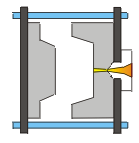Battling China on Price Businesses say Chinese-made items are pricier than Mexican if you consider costs associated with quality, logistics, and engineering changes Like many U.S. purchasing managers, Fred Heegan found himself under pressure over the “China price.” Heegan is …
Continue reading
Category Archives: Diecasting Process
Cold Chamber Die Castings
Cold Chamber Die Castings. Die casting method essentially consists of injecting molten metal under high pressure into a mold or die. It is an adaptable method of fabricating reusable steel molds. The molds are planned to manufacture intricate shapes with high degree of correctness and repeatability. There are two primary processes in die casting, hot chamber and cold chamber.
Hot chamber die castings are utilized for alloys with low melting pot that do not readily attack and wear away metal pots, cylinders and plungers. While cold chamber die castings are utilized for alloys with high melting points like aluminum alloy casting, most ordinary of which is aluminum.
Cold chamber die castings make use of manual method in pouring molten metal. A hydraulic operated plunger will close the cold chamber port. Then, it forces metal into the locked die at very high pressure. The machine uses a disconnected melting furnace and weighs quite a lot of pounds.
The cold chamber die casting machine is situated outside the furnace, as evaluated to hot chamber zinc die casting. Thus, it entails a means of moving the melted alloy from holding furnace to the cold chamber which is fastened between the die casting machine front platen and the die. Transporting the melted metal is normally done with a ladle mechanism. Cycle times can vary between 10 seconds for smaller machines and up to 2 minutes for larger ones.
Cold chamber die casting is more well-liked in the manufacturing industry because of its inexpensive production cost and toughness. It may be more intricate than hot chamber die casting but its steadiness is more beneficial.
Kinetic Die Casting makes great quality aluminum, and Zinc Die Casting If looking for a job or would like a quote please visit our website:Kinetic Die Casting Company
Cold Chamber Die Castings
Cold Chamber Die Castings. Our knowledge had significantly enhanced through time; in this day and age, everything is doable. One of those methods that were bought upon by knowledge is die castings or aluminum die casting. This refers to the process of forcing melted metal which is under pressure into the mold cavities. Almost all die casting is manufactured from alloys for die casting such as copper, zinc, magnesium, aluminum, tin and lead. This method is particularly wanted for applications wherein a enormous quantity of little to medium parts are necessary and must acquire a good detail, well surface state, and dimensional consistency.
Cold chamber die casting process, this utilize a higher-melting point alloys like magnesium and aluminums for example. Because the cold chamber is located outside the furnace, this method calls for a way of proficiently moving the melted metal starting from the holding furnace down to the cold chamber. Essentially, the cold chamber is situated in the center of the die and the die casting machine front platen. In moving the molten metal, this is usually done with the help of a ladle mechanism which may be worked manually or automatically in casting aluminum alloys. In cold chamber die castings, the time devoted may differ. For small machine, it can last for 10 seconds and 2 minutes on the other hand for large machine.
Fundamentally, cold chamber die casting is utilized during times when hot-chamber machines are not obtainable. This method brings smooth cast surfaces and this help minimize or get rid of secondary machining operations while guaranteeing fast production rates.
Kinetic Die Casting manufactures products like heatsink die casting, aluminum housings, and lighting fixtures. If you would like more information, please visit our website:Kinetic Die Casting Company
Hot Chamber And Cold Chamber Die Casting
Hot Chamber And Cold Chamber Die Casting. In the method of die casting, melted metal in injected effectively into die casting molds, or “dies”, under very high pressure. Since this process of shaping metal is very adaptable, die casting is extensively utilized as a method for forming metals into special shapes like die cast speakers. While it may use a almost the same method as mold casting, die casting uses pressures of up to 10 to 210mpa to inject metal into the die. The ensuing material shows consistency of parts, dimensional accuracy, and smooth surface finishes.
There are many diverse materials utilized in die casting, such as copper, zinc, tin, magnesium, and lead. Nevertheless, aluminum is the most extensively uzilized evaluated to these other materials as the metal is more impressionable, and is excellent for manufacturing large size cold chamber die castings, to die castings collected of tiny and intricate parts.
There are two methods utilized for die casting, specifically the cold chamber which manufacture cold chamber die castings, a cold cylinder is injected with melted metal. With less time exposure given for the metal to be pushed into the mold, cold chamber method is more often utilized for metals that without difficulty meld with iron at very high heat. The cold chamber method is also utilized for metals that have high melting points.
Alternatively, in the hot chamber process, like hot chamber zinc die casting the pressure found in the die cavity connected to it becomes enduringly a part of the melted material. A plunger is driven toward an area that is non-pressurized, exposing the inlet port attached to the pressure cylinder.
Kinetic Die Casting manufactures custom metal parts to their customer. If you would like more information about Kinetic Die Casting, please visit our website:Kinetic Die Casting Company
An Overview of Cold Chamber Die Castings
An Overview of Cold Chamber Die Castings. There are numerous methods that the metals have to travel through when they are being utilized in die casting, including cold chamber die castings. If you are new with the whole idea, you must first be informed about the major procedure before you dig further about expressions such as cold chamber die castings.
If you have not heard yet, die casting is well-liked in the metalworking industry for manufacturing lots of mass produced products in such department. Numerous sectors gain from this arrival counting the customer, commercial and industrial products. The integral die cast parts are typically incorporated into aluminum auto parts and aluminum aircraft parts, connectors that are being utilized in building homes, sink faucet, aluminum heatsinks, toys and much more.
Die casting employs an adaptable process that force liquefied metal into steel molds or the dies that are recyclable. This is achieved under high pressure. Through this, intricate shapes are being shaped, which strength and repeatability depend on which type of alloy was utilized in the development. These are some of the alloys that are generally exploited in die castings.
Zinc is said to be the simplest to cast. Aluminum is known for being lightweight and as to having great mechanical properties. Magnesium die casting is the simplest one to machine. Copper is known for its rigidity. Lead and tin are acknowledged for having high density.
Cold chamber die castings are machines that utilize alloys that have high melting points. An awesome example of this is aluminum. Once melted, the metal is placed into the cold chamber. This is also recognized as cylindrical sleeve. This can be poured in by hand with a hand ladle or through the use of automatic ladle. The port of the cold chamber is sealed by a plunger that is hydraulically operated. This forces the metal into the die which is held at tremendous pressures.
Kinetic Die Casting Company can manufacture aluminum car parts, aluminum hardware, and Aluminum Lighting Partsaluminum lighting parts
The Die Casting Part Production Process Explained.
What is the Die Casting Process? The Die Casting Part Production Process Explained.
Kinetic Die Casting Company uses a manufacturing process called “Die Casting” to make aluminum die casting parts and zinc die casting parts. But, what is the die casting part production process? Here is a GIF image I have on our home page to demonstrate:

demonstration of the die casting process
“Aluminum die casting is an aluminum metal parts production process where molten aluminum metal alloy is injected into a steel die, under extreme pressure, to manufacture aluminum parts” (Substitute the word “zinc” for “aluminum” in zinc die casting part production process)
Another GIF example example is on this web page:
(click) What is Die Casting?
Another demonstration of the die casting process

Cold Chamber Die Casting Process
The image pictured above depicts a Cold Chamber Die Casting Machine as it makes parts. The term “Cold Chamber Die Casting” refers to a separate metal melting furnace. The High Pressure Die Casting, cold chamber die casting process follows this sequence:
- Look at the die casting machine image above
- The die casting machine opens the die casting mold.
- The prior part is removed and the die cast mold is sprayed for the next part
- The aluminum is poured using a ladle into a shot cylinder
- The shot piston injects the metal into the die casting mold.
- The machine opens and the process starts again.
Contact Kinetic Die Casting Company for more information about the high pressure die casting process and about how to get great die casting parts at a great price and delivered quickly, no matter what quantity you need.
Kinetic Die Casting manufactures aluminum military parts, aluminum hardware, and aluminum die castings. Visit our website for a quote: Kinetic Die Casting Company

